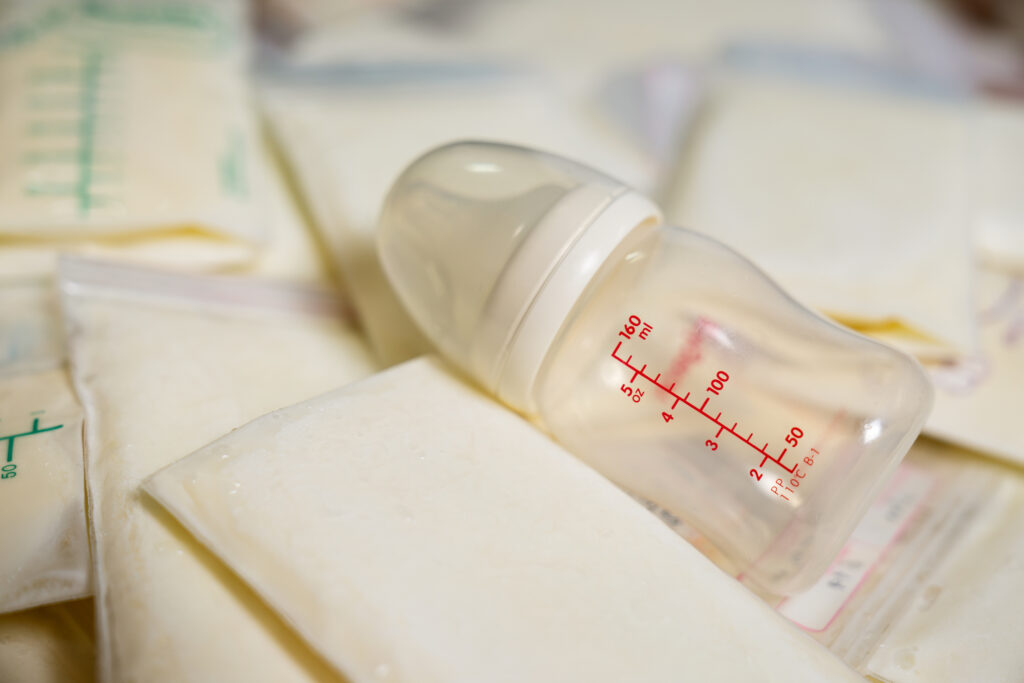Introduction: When Milk Becomes More Than You Can Handle
When I first started pumping in the NICU, my biggest fear was that I wouldn’t make enough milk. Every drop felt precious. I’d stare at the bottles, praying for just one more ounce. Then suddenly, the opposite happened. My body responded so strongly that I was producing far more milk than my tiny NICU baby could take. Bottles lined up in the fridge and freezer. Nurses smiled and called me a “super-producer.”
At first, it sounded like the best possible problem to have, but it didn’t always feel that way.
Oversupply while your baby is in the NICU is physically painful, emotionally confusing, and rarely talked about. Here’s what I wish more moms (and nurses) knew about this experience, and how to manage it without feeling overwhelmed.

The Unexpected Challenge of Oversupply
Everyone talks about low supply. There are entire communities built around boosting milk production, lactation cookies, supplements, power pumping schedules. But oversupply is the quiet opposite problem that many NICU moms don’t realize they can face. When your baby is premature, they might only be taking tiny amounts; 5 mL, 10 mL, maybe 20 mL at a time. Meanwhile, you’re pumping 100 mL or more every few hours. That extra milk has to go somewhere, and fast.
You start filling NICU fridges, coolers, and freezers at home. You wash bottles nonstop. And you constantly worry about what to do with milk that’s nearing its storage limit. Physically, oversupply can cause:
- Engorgement and constant fullness.
- Leaking between pumps.
- Clogged ducts and mastitis.
- Pain or tenderness in the breasts.
- Fatigue from frequent pumping.
- But what makes oversupply in the NICU so complicated is the emotional side.
The Emotional Weight No One Talks About
There’s a strange kind of sadness that comes with producing more milk than your baby can drink. It’s pride mixed with helplessness. You sit beside the isolette, watching your baby’s feeding pump deliver milliliters of your milk. You’re grateful, yet it hurts that you can’t nurse them directly.
“You’re doing amazing,” people say. And you are. But inside, you’re exhausted, sore, and wishing it felt more like bonding than production. Each full bottle becomes both a victory and a reminder. You’re doing everything right, but you still can’t feed your baby in the way you imagined.
There’s also guilt, the kind no one warns you about:
- Guilt for feeling frustrated when your body won’t stop producing.
- Guilt for throwing out milk that’s expired or unneeded.
- Guilt for feeling tired of pumping when your baby depends on it.
But mama, hear this: your feelings are valid. Oversupply doesn’t make you ungrateful, it makes you human.
Why Oversupply Happens (The Science in Simple Terms)
As a nurse and mom, I’ve seen how amazing, and unpredictable the body can be. Milk production works by supply and demand: the more you remove milk, the more your body thinks it needs to make.
In the NICU, that system often gets confused:
- Frequent pumping (every 2–3 hours) can overstimulate supply.
- Stress hormones like cortisol affect letdown differently for each person. Some produce less, some even more.
- Not directly nursing means your body doesn’t get cues from baby’s feeding rhythm, so regulation takes longer.
You’re following all the right advice, but your body doesn’t know your baby isn’t ready to keep up yet.
Practical Tips for Managing Oversupply
If you’re dealing with oversupply, the goal is to relieve discomfort without triggering more milk production.
1. Don’t pump to empty every time.
Pumping to full emptiness tells your body, “We need more milk!” Instead, pump until you’re comfortable, enough to soften your breasts, not drain them.
2. Try gentle hand expression.
If you’re engorged between sessions, express just enough milk to relieve pressure.
3. Use cold compresses after pumping.
It reduces inflammation and slows down milk production naturally.
4. Massage gently before pumping.
It helps prevent clogs and keeps milk flowing smoothly, reducing the risk of mastitis.
5. Discuss regulation with your lactation consultant.
They may suggest:
- Block pumping (limiting sessions to one side for a few hours)
- Gradually spacing out sessions
- Checking for foremilk/hindmilk imbalance
🩷 6. Take care of you.
Hydrate, rest, and eat enough calories, even though it’s hard when you’re running back and forth from the NICU. Oversupply can leave you lightheaded and depleted.
Organizing Your Milk (Without Losing Your Mind)
If you’ve ever opened your freezer and had frozen milk bags fall out like an avalanche, you’re not alone 😅.
Here’s what helped me stay organized:
- Label each bottle or bag with date, time, and amount.
- Store newest milk at the back or bottom(if you are using a chest freezer), and move older milk forward (first in, first out).
- Keep a small notebook or app to track what’s frozen vs. used.
And when you get home, donate if possible, but only if it feels emotionally right for you.
The Mental Load of Pumping and Letting Go
Oversupply adds a layer of pressure to an already heavy NICU journey. You’re managing feeds, schedules, alarms, emotions, and your own recovery.
It’s okay to admit it feels like too much.
It’s okay to say, “I’m grateful. but I’m also tired.”
You’re not weak for feeling both. You’re living through something extraordinary and giving everything you can. Sometimes the bravest thing you can do is decide to pump less, rest more, or focus on bonding instead of output.
What I Learned from Oversupply in the NICU
That experience taught me that love doesn’t measure itself in ounces. It’s in the way you show up, tired, emotional, and determined day after day.
It’s in every bottle labeled at midnight and every tear wiped away beside your baby’s isolette.
Having an oversupply in the NICU showed me that motherhood isn’t about perfection. It’s about endurance, compassion, and grace. Whether you’re struggling with low supply, oversupply, or anything in between, you are doing an incredible job.
Closing Thoughts: You’re Doing Enough
If you’re reading this from a hospital pumping room or at home surrounded by frozen bags of milk, please hear me, you’re doing enough.
Your baby doesn’t just need your milk. They need you. And you’re already giving them that, fully, beautifully, and completely. 💕
If you liked this blog, subscribe for more thoughtful stories and gentle guidance through postpartum recovery, NICU life, and motherhood after trauma. You can also follow me on TikTok and Instagram for more NICU stories, mom tips, and daily encouragement.
